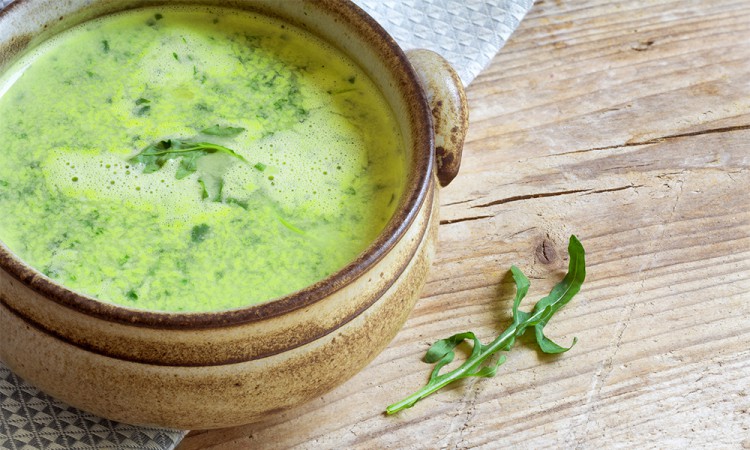I’ve always found detoxing a daunting concept, in that it has been promoted as periods of abstinence and purging, involving foods or liquids I would not normally touch, amid “normal” lifestyle habits and diet.
For me, that’s just not do-able. I gag at meal replacement shakes (not to mention they’re often loaded with sugar, dairy derivatives and salt), and find smoothies and juices either nauseatingly rich or hugely unsatisfying, or both – not to mention dead boring.
This means I think constantly about hot foods laden with my downfalls, fat and salt (eg. hot chips, fish cocktails, pies, spring rolls; oh, and dry, cold Twisties) = I can’t stick to the regimen for more than a couple of days, so then binge on the “bad” stuff to compensate = worse off than before.
Cold foods just don’t do it for me, apart from the occasional interesting salad or ever-irresistible seafood platter. And juice (veg and/or fruit versions) usually leave me feeling and looking disgustingly bloated.
According to Traditional Chinese Medicine (TCM) and Ayurvedic (ancient Indian medicine) principles, warm foods promote digestion as well as appetite satisfaction, while cold foods dampen it. This makes total sense to me – I hasten to add, just my experience and opinion.
Over the last few years my digestion has been sluggish, which impacts on overall wellbeing and energy levels. While colonics, acupuncture, herbs, vitamins, yoga, Pilates and probiotics all help, I know intuitively they are not the actual solution. It’s all about the diet.
I have wanted to “clean up my act” for a while but just couldn’t face the deprivation of a detox, as I’ve experienced them.
As all of us, I have a lot of stuff to do and consider. Thus, freaking out about feeling deprived and hungry is not conducive to a healthy perspective on life or productivity.
A few days ago I came upon The Soup Cleanse, from the team at Soupure in the US and it gave me a “Eureka!” moment; just the thing I’d been looking for.
It’s an eminently sustainable lifestyle, not a fast, faux fix. Notably, it has an incredible yum factor.
The ingredients of most cleanse/detox soups are recommended to be blended, as they’re easier to digest and therefore better facilitate the detox process. But I reckon (again, just this layperson’s opinion), if needing a bit of something to get your teeth into will keep you on track … go for it!
I’m going to do it. You may want to do it. And it’s good fare to share with your clients who want to “get clean” to optimise the professional treatments you are offering them but baulk at “cleanses” as we’ve largely come to know them.
SPA+CLINIC shares an extract from The Soup Cleanse, by Angela Blatteis and Vivienne Vella, the Los Angeles-based founders of Soupure.
The gals (Vivienne tells SPA+CLINIC she spent some years as a child in Melbourne and, now that she’s a mum, would love to return to this “incredibly beautiful country”) have a big cult fan base in the US. Among their fans is Gwyneth “Goop” Paltrow.
 WHY A SOUP CLEANSE MIGHT BE RIGHT FOR YOU
WHY A SOUP CLEANSE MIGHT BE RIGHT FOR YOU
By Angela Blatteis and Vivienne Vella
Soups are coming to the forefront. They’re full of vegetables, spices and (often) good-for-your-gut bone broth. Basically, they’re the warming, savoury version of a smoothie.
With a juice shop on every corner, you might think that cold-pressed juice had all the answers. We get it!
It’s tempting to think we can cure all of our ailments and complaints with what’s in those attractive bottles. Plus, who doesn’t love a refreshing glass of juice? We’re certainly not opposed to the occasional green juice.
But let’s face it, cold juice that is void of fibre and protein is not a meal. So how do you have a whole day of it and feel satisfied? Or nourished?
Soups, on the other hand, are full of all the nutrition and sustenance you need to not feel depleted or deprived. It’s why we say “Souping is the new juicing”.
We don’t think juice is necessarily bad if enjoyed in moderation or as a supplement to your regular diet, but we do believe – and doctors, nutritionists, and fitness experts agree – that soups are a better way to support the body. Here’s why:
Foods like to be whole
Plants, especially fruits and vegetables, hold a tremendous amount of nutrients in all of their bits and bobs – the peel, pulp, rind, seeds, and flesh. That’s why we believe that all of it should go into our nourishing soups. But most importantly, using whole fruits and vegetables means getting every bit of their fibre.
Fibre is king and queen
As we mentioned above, fibre is essential to total health. So why throw it away?!
Think about the little tray under your juicer after you’ve juiced some carrots, Swiss chard or beets. That mound of stringy confetti – that’s fibre! Not including it in the mix reduces most fruits and vegetables to simple sugars, which spike your blood sugar levels, leave your liver overworked, and create imbalance in your kidneys.
Plus, when you dismantle a whole food, you’re not getting all of its macronutrients, like protein and good fats. Without them, your body has a harder time absorbing other good stuff, rendering many vitamins and minerals unusable.
Last, all that fibre is what’s going to bind to the toxins in your system and pull them out of your intestinal tract and colon.
Some vegetables need cooking
The body requires food in a variety of forms – raw and not raw – in order to feel optimally good. While eating raw food is necessary for good health, it’s important for your absorption of plant protein and your nutrient diversity to include gently cooked food too.
Don’t get left in the cold
According to ancient wisdom shared by Traditional Chinese Medicine (TCM) and Ayurveda (ancient Indian Hindu medicine), warming foods are more healing, nourishing and soothing to the body.
They are the first real “comfort foods” known to mankind. They also help stoke the digestive fire, which is at the centre of the body’s ability to break down and assimilate foods and all their nutrients.
Having a lot of cold foods can put out that fire and dampen your digestion as well as your energy level.
Just think about it: Would you rather have a day of cold liquid or hearty, warm comfort food?
Above all, our favourite feature of souping is that it’s not something you do before you start your diet. It is the diet! It’s not something you have to get through in order to get to the next phase. It is the phase.
It’s a lifestyle that you can maintain forever and ever because you’re not starving and you’re eating in a way that continuously supports the body.
And it’s easy to follow this program. Souping won’t disrupt all the other things you have going on in your busy life.
Give these soup recipes a try:
Zucchini, Basil and Spinach Soup
* Excerpted from the book The Soup Cleanse by Angela Blatteis and Vivienne Vella. Copyright © 2015 by Angela Blatteis and Vivienne Vella. Reprinted with permission of Grand Central Life & Style. All rights reserved.
The book is not yet available in Australia (SPA+CLINIC is working on them!) but can be ordered through the website.




